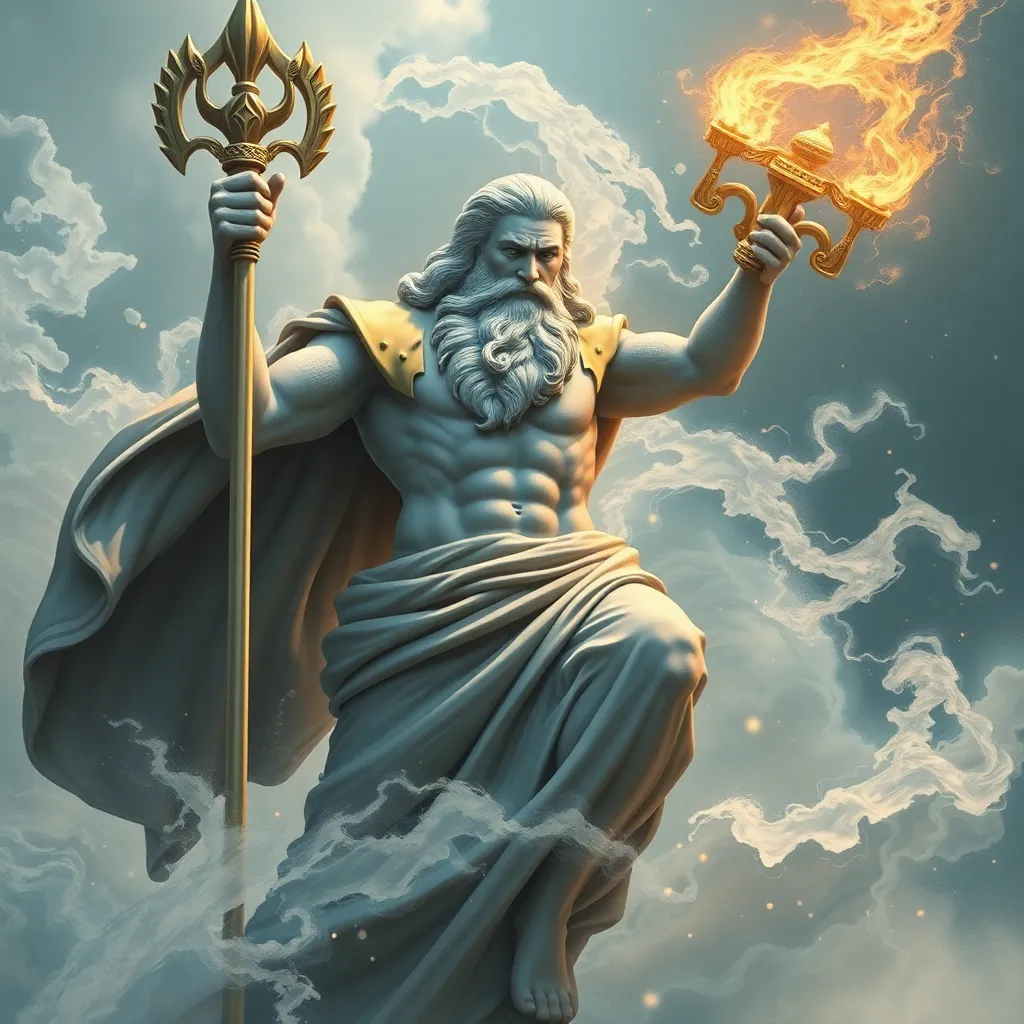Zeus and the Nature of Heroism: Lessons from His Interventions
I. Introduction
Zeus, the omnipotent ruler of Mount Olympus, stands as a central figure in Greek mythology, embodying the complexities of divine power and human experience. His character is multifaceted, reflecting both authority and compassion, serving as a model for understanding heroism in ancient Greek culture.
Heroism in this context is not merely about physical strength or battlefield glory; it encompasses moral courage, self-sacrifice, and the pursuit of justice. This article aims to delve into the lessons on heroism derived from Zeus’s interventions in various myths, shedding light on how these ancient narratives resonate with contemporary ideals of heroism.
II. Understanding Zeus: The King of the Gods
Zeus, the son of Cronus and Rhea, is often depicted wielding a thunderbolt, symbolizing his dominion over the sky and his role as a bringer of justice. He is characterized by several attributes:
- Supremacy over gods and mortals
- Guardian of oaths and social order
- Patron of hospitality and the rule of law
In the pantheon of Greek mythology, Zeus holds a pivotal position, overseeing the affairs of both gods and humans. His relationships with other deities, such as Hera, Poseidon, and Athena, reflect a complex web of alliances and rivalries that shape the myths.
The dual nature of Zeus is particularly noteworthy; he embodies both authority and compassion. While he enforces order and punishes transgressors, he also provides guidance and support to heroes, illustrating the balance required in true leadership.
III. The Concept of Heroism in Greek Mythology
Heroism in ancient Greece extends beyond mere acts of valor in battle. It is defined by the following characteristics:
- Bravery: The willingness to face danger or adversity.
- Honor: Upholding one’s reputation and the values of society.
- Sacrifice: Putting the needs of others before oneself, often at great personal cost.
Divine intervention plays a significant role in the narratives of heroes. The gods frequently guide, challenge, or aid heroes, emphasizing the belief that heroism is not only achieved through individual effort but also through the support of the divine.
IV. Zeus’s Interventions: Key Myths and Their Impact
Throughout Greek mythology, Zeus’s interventions have significantly shaped the outcomes of various myths. Some key examples include:
- The Trojan War, where Zeus’s decisions influenced the fates of countless heroes.
- The Twelve Labors of Heracles, showcasing both Zeus’s paternal role and the trials of heroism.
In the case of the Trojan War, Zeus played a crucial role by balancing the fates of the Trojans and the Greeks. His interventions highlighted the complexity of heroism as he navigated the desires of both mortals and immortals.
Similarly, in Heracles’ story, Zeus is depicted as a father who, despite his absence, influences his son’s path. Heracles’ labors are not just tests of strength but reflect the ideals of perseverance and moral integrity, showcasing how Zeus’s legacy endures through his son’s struggles.
V. Lessons on Heroism from Zeus’s Interventions
Zeus’s interventions offer several lessons on heroism:
- The balance of power: Leadership comes with responsibility. Zeus exemplifies the need for justice and order, reminding us that true leaders must consider the impact of their decisions.
- Guidance and mentorship: The importance of support in heroic journeys is evident in Zeus’s interactions with various heroes. Mentorship can shape the paths of those seeking to achieve greatness.
- Fate vs. free will: The interplay between destiny and personal choice is a recurring theme in hero narratives. While Zeus influences outcomes, the heroes must still navigate their choices, illustrating the complexity of heroism.
VI. The Modern Interpretation of Zeus and Heroism
In contemporary culture, Zeus is often viewed through a lens that blends admiration with critique. His heroic traits, such as leadership and authority, are mirrored in modern ideals, where the concept of heroism continues to evolve.
Parallels can be drawn between ancient heroism and modern-day ideals:
- Leadership is still viewed as a vital quality.
- Mentorship remains crucial in personal and professional development.
- The struggle between fate and free will resonates with individual choices in today’s society.
The lessons imparted by Zeus remain relevant, serving as a reminder of the complexities of heroism and the moral dilemmas that accompany leadership.
VII. Critiques of Zeus’s Heroic Standards
Despite the lessons derived from Zeus’s character, his actions are not without criticism. Some key points of examination include:
- Morally ambiguous actions: Zeus’s numerous infidelities and manipulative behaviors raise questions about the moral standards of a hero.
- Consequences of divine intervention: The impact of Zeus’s decisions often leads to unintended suffering, challenging the notion of benevolent leadership.
- Alternative views on heroism: Many heroes in Greek mythology, such as Prometheus, challenge Zeus’s model, emphasizing rebellion against oppressive authority.
VIII. Conclusion
In summary, the exploration of Zeus and his interventions reveals profound insights into the nature of heroism. His dual role as a powerful ruler and a mentor provides a framework for understanding the complexities of leadership, guidance, and ethical dilemmas.
The legacy of Zeus continues to influence our understanding of heroism, prompting reflection on the values we uphold in contemporary society. As we delve deeper into the interconnectedness of mythology and modern ideals, we invite further exploration of these timeless themes.




